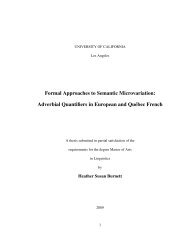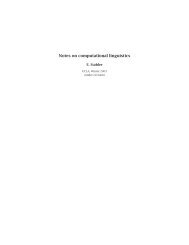A Grammar of Miya - UCLA Department of Linguistics
A Grammar of Miya - UCLA Department of Linguistics
A Grammar of Miya - UCLA Department of Linguistics
Create successful ePaper yourself
Turn your PDF publications into a flip-book with our unique Google optimized e-Paper software.
202 A <strong>Grammar</strong> <strong>of</strong> <strong>Miya</strong><br />
abut is word initial. It thus seems as if words with the a- prefix treat the Cr aC 2 V sequence<br />
as word initial for the purposes <strong>of</strong> syllable formation.<br />
We now tum to the question <strong>of</strong> the origin and function <strong>of</strong> this prefix. It correlates in no<br />
way with lexical or semantic features, i.e. it appears on masculine, feminine, and plura]<br />
nouns, and on nouns with animate, inanimate, mass, and count reference. As the examples<br />
from other languages suggest, it also does not seem to correlate with cross-linguistic variables.<br />
Phonological characteristics furnish one key to its origin: the prefix always bears Bthe<br />
minimum stem to which it may be prefixed is CVC(a); tonally, the majority <strong>of</strong> word;<br />
with the a- prefix have a downstepped H on the syllable after the prefix, the next largest<br />
number copy the H <strong>of</strong> the prefix, and L after the prefix occurs on the fewest number <strong>of</strong><br />
stems. Of those with L, all have three or more consonants, e.g. avakiy 'thorn', avwilnrfa<br />
'slipperiness'. ill fact, these proportions <strong>of</strong> tonal and segmental shapes for noun stems are<br />
in about the same proportions as for nouns without the a- prefix. With this in mind, we<br />
might search for some sort <strong>of</strong> formative which would appear only before nouns, and moreover,<br />
nouns not falling into any particular lexical or semantic category. Such a formative is<br />
the -a which forms part <strong>of</strong> the direct genitive construction for a feminine head noun<br />
(lO:§3.1.1), e.g. tiltsiy + laaha ... tatsiy-a laaha 'tendon <strong>of</strong> jackal'. Since this linker appears<br />
in only a subset <strong>of</strong> genitive constructions (cf. kusiy laaha 'bone <strong>of</strong> jackal', with a<br />
masculine head noun), one can imagine that a reanalysis could have taken place, much as in<br />
English an ewt> a newt, associating the a with the second ratber than the first noun, followed<br />
by eventuallexicalization <strong>of</strong> some nouns with this new "prefix". This scenario receives<br />
support from two behaviors <strong>of</strong> the prefix. First, the linking -a is Toneless, i.e. it<br />
copies its tone from the preceding syllable; following a pause the a- prefix always bears H,<br />
the default tone for Toneless domains (3:§3.1). Second, the prefix is absent in just those<br />
environments where it is bound by some other noun phrase constituent, i.e. in just those<br />
environments which would have furnished the ambiguous analysis to yield the prefix in the<br />
first place. The environments where the prefix is retained are those where the noun would<br />
be used in its "free", lexical form. I have no ready explanation for the fact that the prefix is<br />
long in the "elsewhere" environments other than to point out that <strong>Miya</strong> has a number <strong>of</strong><br />
other lengthening processes which I do not fully understand.<br />
2.4.2. Suffix -(wa)t •• A few nouns have a suffix -ta, with variant -ti under morphological<br />
palatalization (2:§4), and in three words in my corpus, a variant -wata. This suffix appears<br />
to be a formative for abstract nouns, making nouns from verbs in four cases, a noun<br />
from an adjective in at least one case (possibly two, if 'sweetness' is from an adjective-I<br />
could find no related root), and abstract nouns from nouns in three cases. The following<br />
list is exhaustive for my materials:<br />
agwarzhiwatg (m) 'growing up' cf. gwarzCJ ,<br />
'grow up'<br />
tlyto (f) 'beating' cf. tiy 'beat'<br />
ayereti (m) 'growing old' cf. ghar 'grow old'<br />
funbihnati (m) 'miserliness' cf.mbMma 'wink, blink'<br />
kyarati (m) 'height' cf. karakara- 'tall'<br />
piyato (m) 'sweetness'
















